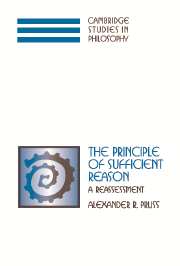1 - Introduction
Published online by Cambridge University Press: 27 July 2009
Summary
Nothing happens in vain, but everything for a reason and under necessitation.
– Leucippus (Diels and Kranz, 1985, 67B2)THE SIGNIFICANCE OF THE PSR
An airplane crash is investigated thoroughly. No cause for the malfunction is found. The investigative team reports that the plane crashed for no cause. We naturally object: “You mean, it crashed for no apparent cause.” But the team insists that in fact there was no cause. Of course we might question the epistemic bona fides of this finding. After all, there could always be some cause beyond our ken. But can we do more? Can we insist that there must have been a cause?
The Principle of Sufficient Reason (PSR) claims we can. Everything that is the case must have a reason why it is the case. Necessarily, every true or at least every contingent true proposition has an explanation. Every event has a cause. The PSR in various guises is as old as philosophy. Parmenides used it to argue that there was no such thing as change. St. Thomas proved the existence of God with a version of it apparently based on his distinction between being and essence. Spinoza's version implied that there is no contingency. Leibniz attacked Newtonian absolute space for violating it and, together with Spinoza, used the PSR as part of an argument against libertarian free will. Kant grounded a phenomenal version of it in the causal nature of time and, arguably, based his transcendental idealism on a noumenal version (cf. Rescher, 2000b).
Information
- Type
- Chapter
- Information
- The Principle of Sufficient ReasonA Reassessment, pp. 3 - 19Publisher: Cambridge University PressPrint publication year: 2006
